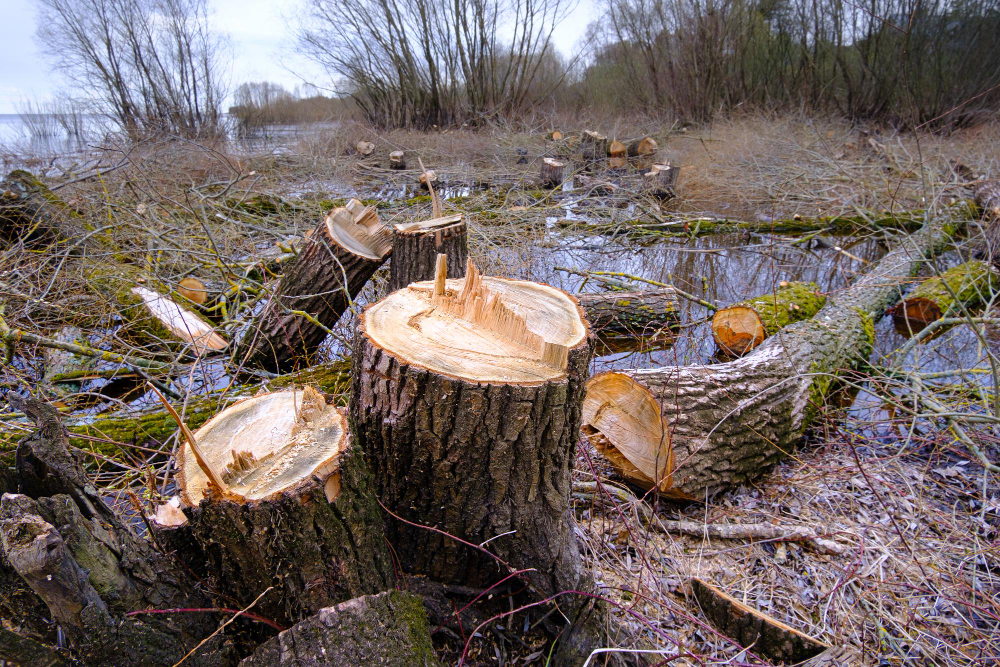
Turinio lentelė
Įvadas
Miškų naikinimas yra aktyvus pasaulinis klausimas, labai prisidedantis prie klimato pokyčių, biologinės įvairovės praradimo ir ekosistemų blogėjimo. Europos Sąjunga (ES) priėmė griežtus kovos su miškų naikinimu ir miškų degradacija, susijusio su prekėmis ir produktais, importuojamais į ES rinką, eksportuojamus, eksportuojamus, iš jų. Šis straipsnis gilinasi į apibrėžimus, taikymo sritį, išsamius reikalingus veiksmus ir deramo patikrinimo procesus, išdėstytus ES reglamente, siekiant sušvelninti miškų naikinimą.
Svarbūs apibrėžimai
Reglamente naudojamos terminijos supratimas yra labai svarbus laikymosi ir veiksmingo įgyvendinimui. Čia yra pagrindiniai apibrėžimai:
- Atitinkamos prekės: Galvijai, kakava, kava, aliejaus palmes, guma, soja ir mediena.
- Atitinkami produktai: I priede išvardyti produktai, kuriuose yra, buvo maitinami arba jie buvo gaminami naudojant atitinkamas prekes.
- Miškų naikinimas: Miško pavertimas žemės ūkio naudojimu, nesvarbu, ar tai yra žmogaus sukelta, ar ne.
- Miškas: Žemė, apimanti daugiau nei 0,5 ha, o medžiai yra didesni nei 5 metrai, o baldakimo danga viršija 10%, išskyrus žemės ūkio ar miesto naudojimą.
- Žemės ūkio naudojimas: Žemės naudojimas žemės ūkiui, įskaitant plantacijas ir gyvulių auginimą.
- Miško degradacija: Struktūriniai miško dangos pokyčiai, pirminių miškų pavertimas plantacijų miškais ar kitomis miškingomis žemėmis.
- Operatoriai: Operatorius yra bet kuris natūralus ar legalus asmuo, kuris komercinės veiklos metu pateikia atitinkamus produktus rinkoje arba eksportuoja juos.
- Prekybininkai: Prekybininkas yra bet kuris tiekimo grandinės asmuo, išskyrus operatorių, kuris komercinės veiklos metu gamina atitinkamus produktus rinkoje.
Reglamento taikymo sritis
Reglamentas taikomas šiam:
- Pateikimas ir pateikimas ES rinkoje, taip pat eksportuojami atitinkami produktai, išvardyti I priede, kuriame yra, buvo maitinami arba jie buvo gaminami naudojant atitinkamas prekes.
- Reglamente siekiama:
- Sumažinkite ES indėlį į pasaulinį miškų naikinimą ir miškų degradaciją.
- Sumažinkite šiltnamio efektą sukeliančių dujų išmetimą ir biologinės įvairovės praradimą.
Išimtys daromos atitinkamiems produktams, pagamintiems prieš konkrečias datas, kaip išsamiai aprašyta 37 straipsnio 3 dalyje.
Reikalingi išsamūs veiksmai
Draudimas ir laikymasis
Operatoriai privalo užtikrinti, kad atitinkami produktai atitiktų šias sąlygas, prieš pateikdami juos į rinką ar eksportuodami:
- Be miškų naikinimo: Produktuose turi būti, būti maitinami arba gaminami naudojant prekes, kurios nėra pagamintos naikintoje žemėje po 2020 m. Gruodžio 31 d.
- Teisinė produkcija: Produktai turi atitikti atitinkamus gamybos šalies įstatymus.
- Deramo patikrinimo pareiškimas: Turi būti pateiktas deramo patikrinimo pareiškimas, patvirtinantis, kad atitiktis reglamentavimui.
Operatorių įsipareigojimai
Operatoriai privalo atlikti deramą patikrinimą:
- Informacijos rinkimas: Renka būtinus duomenis ir dokumentus, įrodančius, kad laikomasi reglamento.
- Rizikos vertinimas: Įvertinkite nesilaikymo riziką, pagrįstą surinkta informacija.
- Rizikos mažinimas: Įgyvendinant nustatytą riziką sušvelninti priemones, užtikrinant nereikšmingą nesilaikymo riziką.
Operatoriai penkerius metus privalo saugoti deramo patikrinimo įrašus ir paprašius juos suteikti kompetentingoms institucijoms. Jie taip pat turi padėti valdžios institucijoms čekių metu ir perduoti atitinkamą informaciją apie atitiktį tiekimo grandinėje.
Prekybininkų įsipareigojimai
Prekybininkai privalo:
- Rinkitės ir saugokite informaciją apie jų prekiaujančius produktus, įskaitant tiekėjų ir pirkėjų informaciją.
- Išlaikykite įrašus mažiausiai penkerius metus ir paprašius, pateikite juos kompetentingoms valdžios institucijoms.
- Padėkite kompetentingoms institucijoms atlikti atitikties patikrinimus.
Įgalioti atstovai
Operatoriai ir prekybininkai gali paskirti įgaliotus atstovus jų vardu pateikti deramo patikrinimo pareiškimus. Tačiau atsakomybė už atitiktį tebėra originaliam operatoriui ar prekybininkui.
Deramo patikrinimo procesas
Informacijos reikalavimai
Operatoriai privalo rinkti ir išlaikyti informaciją, pavyzdžiui::
- Produkto aprašymas ir prekės pavadinimas.
- Produktų kiekis.
- Gamybos gamybos ir žemės geografinės padėties šalis, naudojama gamybai.
- Tiekėjo ir pirkėjo informacija.
- Miškų naikinimo statuso ir teisinės gamybos įrodymai.
Rizikos vertinimas
Operatoriai turi patikrinti ir išanalizuoti surinktą informaciją, kad įvertintų nesilaikymo riziką. Rizikos vertinimo kriterijai apima:
- Rizikos lygis, priskirtas gamybos šaliai.
- Miškų ir vietinių tautų buvimas.
- Miškų naikinimo ir miško degradacijos paplitimas.
- Dokumentacijos ir informacijos šaltinių patikimumas.
Rizikos mažinimas
Jei nustatoma nenugalima rizika, operatoriai turi priimti rizikos mažinimo priemones, tokias kaip:
- Gauti papildomos informacijos.
- Atliekant nepriklausomą auditą.
- Tiekėjų atitikties pastangos.
Operatoriai privalo dokumentuoti ir peržiūrėti rizikos mažinimo sprendimus kasmet.
Baudos už neatitikimą
Baudos už neatitikimą apima:
Baudos:
- Baudos yra proporcingos padarytai žalą aplinkai ir ekonominė nauda, gauta dėl pažeidimo.
- Legaliems asmenims baudos gali būti iki 4% visos operatoriaus ar prekybininko metinės sąjungos apyvartos finansiniais metais prieš sprendimą dėl baudos. Bauda gali būti padidinta siekiant užtikrinti, kad ji viršytų galimą ekonominę naudą, gautą dėl nesilaikymo.
Konfiskavimas:
- Neatitinkančių produktų konfiskavimas ir visos pajamos, gautos iš sandorių, susijusių su tais produktais.
Laikina išimtis:
- Laikinas iki 12 mėnesių išimtis iš viešųjų viešųjų pirkimų procesų ir galimybė gauti valstybės finansavimą, įskaitant dotacijas ir nuolaidas.
Draudimas:
- Laikinas draudimas rinkoje pateikti ar gaminti turimus neatitinkančius produktus, ypač esant dideliems ar pakartotiniams pažeidimams.
IT ataskaitų teikimo įsipareigojimai operatoriams ir prekybininkams
Informacinė sistema
ES reglamentas įpareigoja sukurti informacinę sistemą iki 2024 m. Gruodžio 30 d. Ši sistema bus:
- Registracijos operatoriai ir prekybininkai: Įskaitant jų įgaliotus atstovus į sąjungą.
- Saugokite deramo patikrinimo teiginius: Kiekvieno teiginio atskaitos numerių priskyrimas ir perdavimas.
- Konvertuoti geografinės padėties duomenis: Nuo atitinkamų sistemų tiksliai nustatyti geografinę vietą.
- Įrašykite patikrinkite rezultatus: Apie deramo patikrinimo teiginius.
- Integruokite su muitinėmis: Per Europos Sąjungos vienkartinius muitinės aplinką.
Kaip „Commarket“ komanda gali jums padėti?
- „ComplyMarket“ siūlo sistemos deramo patikrinimo ataskaitos sąsają
- „ComplyMarket“ gali rinkti jūsų tiekėjų deramo patikrinimo informaciją, naudodami „Complydoc“
- „ComplyMarket“ siūlo ad-hoc konsultacijas
Dalykitės su savo bendruomene
Komentarai
Palikite komentarą arba užduokite klausimą




